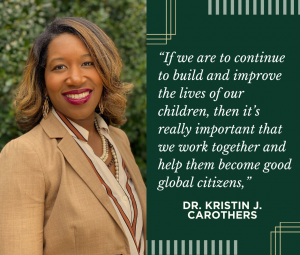 On Tuesday, April 20, the Parents’ Association Diversity, Equity, and Inclusion (DEI) Committee, co-chaired by Kathy Yang and Nina Norwood, invited Child Psychologist Dr. Kristin J. Carothers for a webinar to help the parent community understand how children can learn to be good global citizens and how to best support the community.
On Tuesday, April 20, the Parents’ Association Diversity, Equity, and Inclusion (DEI) Committee, co-chaired by Kathy Yang and Nina Norwood, invited Child Psychologist Dr. Kristin J. Carothers for a webinar to help the parent community understand how children can learn to be good global citizens and how to best support the community.
Formally trained as a Clinical Child Psychologist, Dr. Carothers has expertise in Cognitive Behavioral Therapy and Behavioral Intervention. She earned her B.S. from Howard University and her MA/Ph.D. in Clinical Psychology from DePaul University. Dr. Carothers completed a pre-doctoral internship at the Columbia University Medical Center and a post-doctoral fellowship in Trauma-focused Cognitive Behavioral Therapy at St. John’s University’s Child H.E.L.P. partnership. Currently, Dr. Carothers is in private practice and provides individual CBT to children, adolescents, and adults. She also provides co-parenting therapy for families experiencing high conflict.
The presentation for Gaynor parents was titled “Cultivating Global Citizens: Helping Parents Have Courageous Conversations During These Turbulent Times,” and approximately fifty people tuned in on Zoom to watch Dr. Carothers’ presentation and participate in a question and answer session.
The evening began with a welcome from Head of School Dr. Scott Gaynor, and brief remarks from Parents’ Association President Megan Hogan.
“Just by being here tonight and being willing to have these conversations with your children, you are showing that you can be vulnerable, you can learn, and you can partner with the school in our efforts to develop global citizenship in our children,” Dr. Gaynor said.
Ms. Hogan then talked about the importance of the evening and introduced Dr. Carothers.
“I understand that in speaking with many of you, you’re looking for ways to build empathy and understanding within your own families and communities,” she said. “We as parents have a real responsibility to fill the void, because if our children aren’t learning from us, they’re learning about these subjects and challenging conversations from their friends, from TV, from what they hear on the street. It is really our responsibility to make sure that we’re giving them the language and the tools to make sure they’re having open and honest discussions, albeit challenging at times.”
After her introduction, Dr. Carothers joined the webinar and greeted the Gaynor community. She gave an overview of what to expect from the evening and the goals.
“The purpose of this talk is to really help parents have conversations that are difficult,” she said. “Conversations that may bring up difficult feelings or emotions, or different perspectives, but are important as we raise our children.”
She said that her purpose in coming to talk to the Gaynor community was to advocate for children, and focus on building empathy in our children today.
“If we are to continue to build and improve the lives of our children, then it’s really important that we work together and help them become good global citizens,” she said.
According to Dr. Carothers, social emotional learning and racial literacy go hand in hand. It’s also important to have conversations in developmentally appropriate ways. “If we’re cultivating global citizens, it’s going to be really important that we’re teaching kids how to be aware of differences in perspective; how to honor their own identities and feel proud of who they are; how to manage their emotions when they’re feeling frustrated or upset or engaged in a conflict; and most importantly, how to show empathy, because empathy allows us to build and maintain relationships,” she said.
She said racism is difficult to talk about because it is a complex issue that may bring up feelings of guilt, shame, anger, sadness, and disparity. This complexity causes us to want to avoid conversations around these topics because they make us anxious.
“The purpose of having these discussions about race and racism is to start taking things out of the closet so we can clean it,” she said. “We’re not saying that everything will be better after we have these conversations, but we’re saying this closet is cluttered, so we have to take some stuff out and be real about what it is.”
Closing out the presentation, she encouraged parents to have these courageous conversations with their children and to be honest. She also discussed how to empower children to be advocates, including saying something if you see something, not ignoring bad behavior, getting help, and understanding that unintentional behaviors still hurt.
